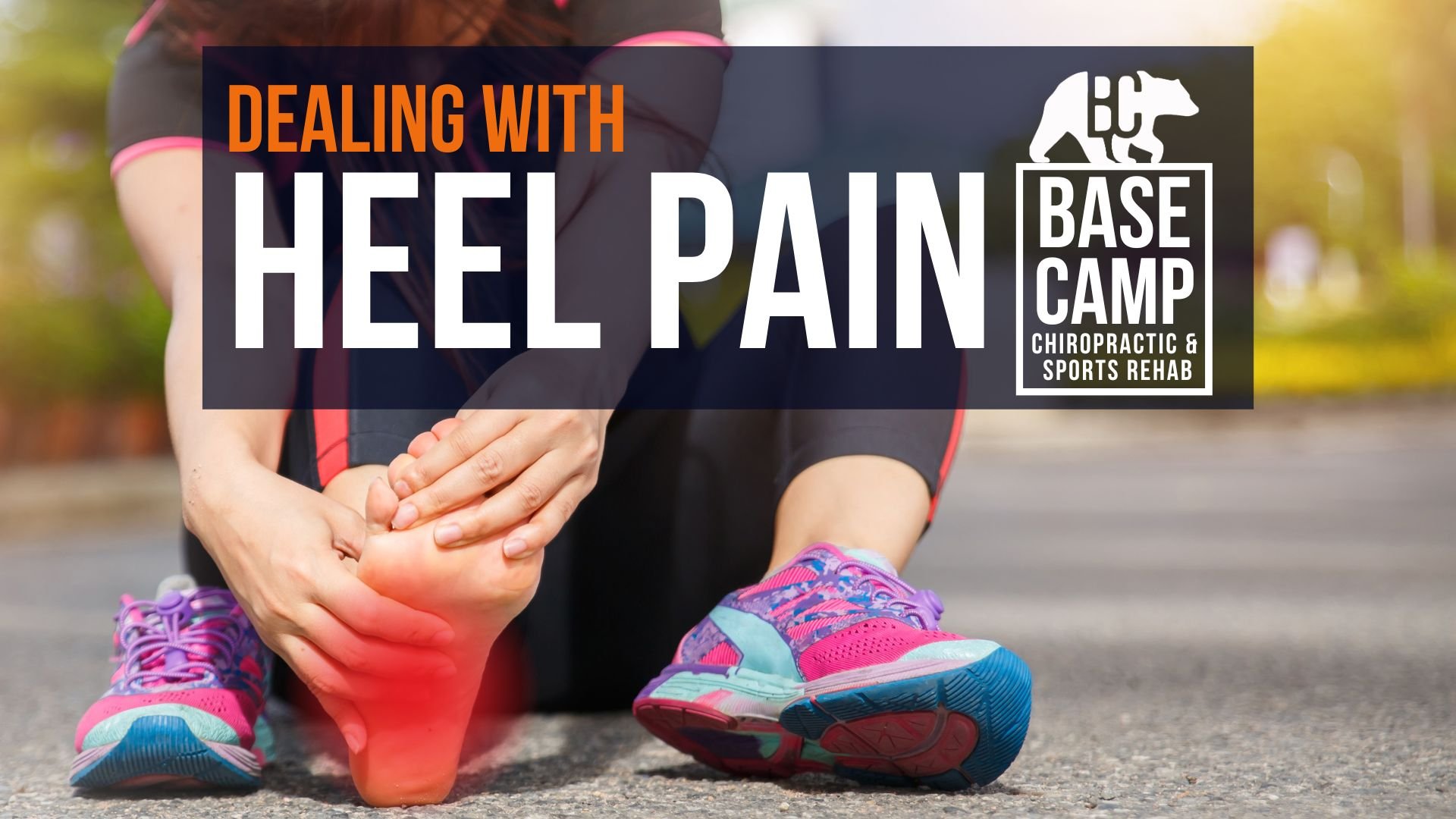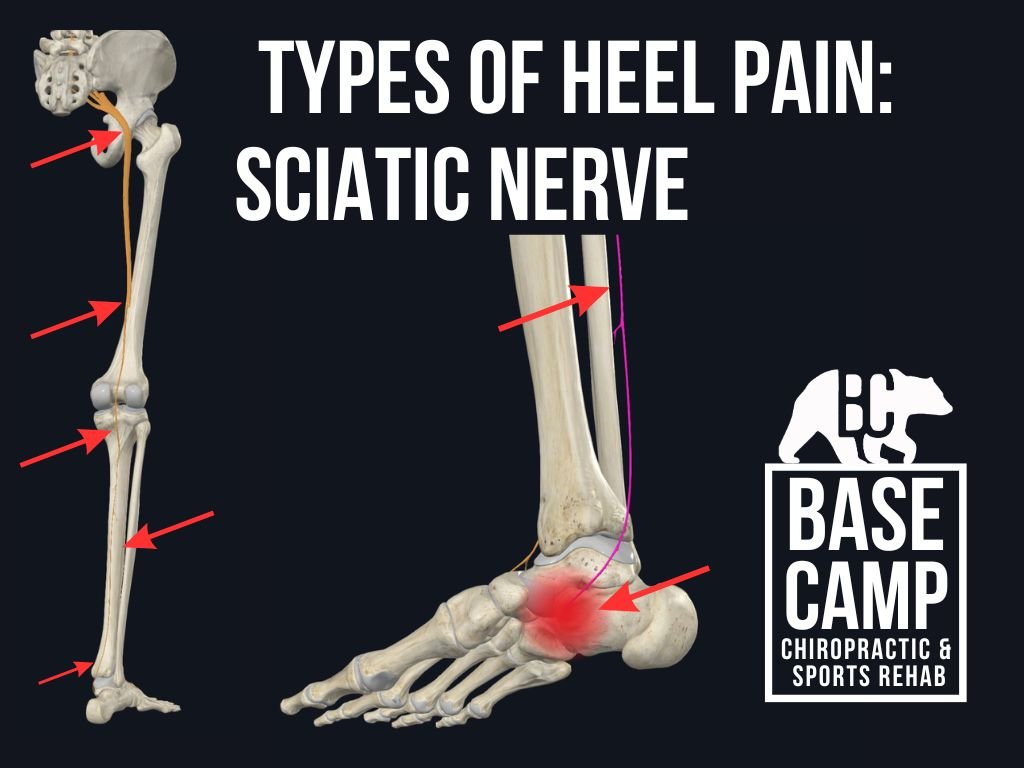Heel Pain in Runners
Heel pain in runners is common. It is especially prevalent in new runners, experienced runners getting back into running, and runners who have started a new program or increased their running volume.
If you are experiencing heel pain, I don’t have to tell you how frustrating and painful it can be. It often sidelines runners and is rarely a quick fix.
Here are some things you should know about heel pain in runners and how we approach heel pain here at our sports rehab clinic, Base Camp Chiropractic in Vernon.
Types/Causes of Heel Pain
Heel pain commonly comes from 3 or 4 different sources.
Plantar fasciitis
If you are a runner and haven’t heard of plantar fasciitis, you have clearly been spending too much time with your headphones in, because I guarantee someone you know has it or has experienced it.
Plantar fasciitis is when the fascia (connective tissue that supports your arch) is over-stressed and becomes inflamed and irritated. It is typically worst in the morning and while you are running. The onset is often sudden, and you just wake up one day with heel pain.
You can test your plantar fascia by pressing on point 1 (in the picture) and passively extending your big toe with your other hand. If this is extremely painful, there is a chance you have plantar fasciitis.
To deal with this, try this stretch every morning: Plantar Fascia Stretch
… and check out this article on foot strengthening exercises: Foot Strength for Runners
You can also try things like orthotics or a heel lift to change the load on your heel as a temporary change to deload the irritated tissues.
Achilles tendonitis
Achilles tendonitis is common in runners who have started to introduce a lot of uphill running. The Achilles tendon becomes overloaded and irritated, and can no longer recover from your running. Pain can be located along the calf, between the muscle and the heel. For some people, that pain can radiate down to the bottom of the heel and foot as well.
To work on this, you need to work on your calf strength and ankle range of motion.
Start working on your calf using calf raises. If calf raises are painful, you can limit your range of motion to start (see the video below).
You can also work on calming down your calf muscle tone by using foam rolling and the 3-direction ankle mobilization (the other videos below).
You can also try things like orthotics or a heel lift to change the load on your heel as a temporary change to deload the irritated tissues. I often recommend limiting your uphill running when the Achilles is really irritated. In general, shoes with a larger drop (an elevated heel relative to the ball of the foot) will decrease your chance of developing Achilles pain and improve symptoms.
Stress fracture
Stress fractures happen when the stress we have put the bone through is more than it can recover from. These injuries happen over time.
There is only one solution to stress fractures: rest.
Unfortunately, if a stress fracture is the cause of your symptoms, then you have to stop running for a few weeks and wear an air cast until the bone has healed.
Stress fractures are often very tender to the touch, you may have redness or swelling, and trouble running or walking at all.
If you think you might have a stress fracture, you need to go see a chiropractor, physician, or physiotherapist in Vernon who works with runners.
Sciatic nerve
I see a lot of cases of heel and foot pain that have been diagnosed as ‘plantar fasciitis’ when in reality the problem is coming from the lower back. The sciatic nerve starts in the lower back and goes down to the bottom of the foot. In this case, the foot is not the primary culprit, even though the symptoms are in the foot.
TRY THIS STRETCH:
If this stretch makes your foot BETTER then we can be pretty confident that the lower back is involved. If this is the case, it is worth getting assessed by a physiotherapist or chiropractor in Vernon who can help you work on the lower back and whatever might be causing the symptoms.
(PSA: it is NOT because your pelvis or hips are out).
Don’t let your pain or injuries hold your back. Book a free consult with Dr Mark to get you back on the trails and stay injury free this running season.
Author: Dr Mark Murdoch, Chiropractor and Co-Founder at Base Camp Sport and Spine in Vernon, BC.
Mark Murdoch is a Doctor of Chiropractic with a Master’s Degree in Sports Medicine.
Contact: drmurdoch@basecampclinic.com
Instagram: Base.Camp.Doc






